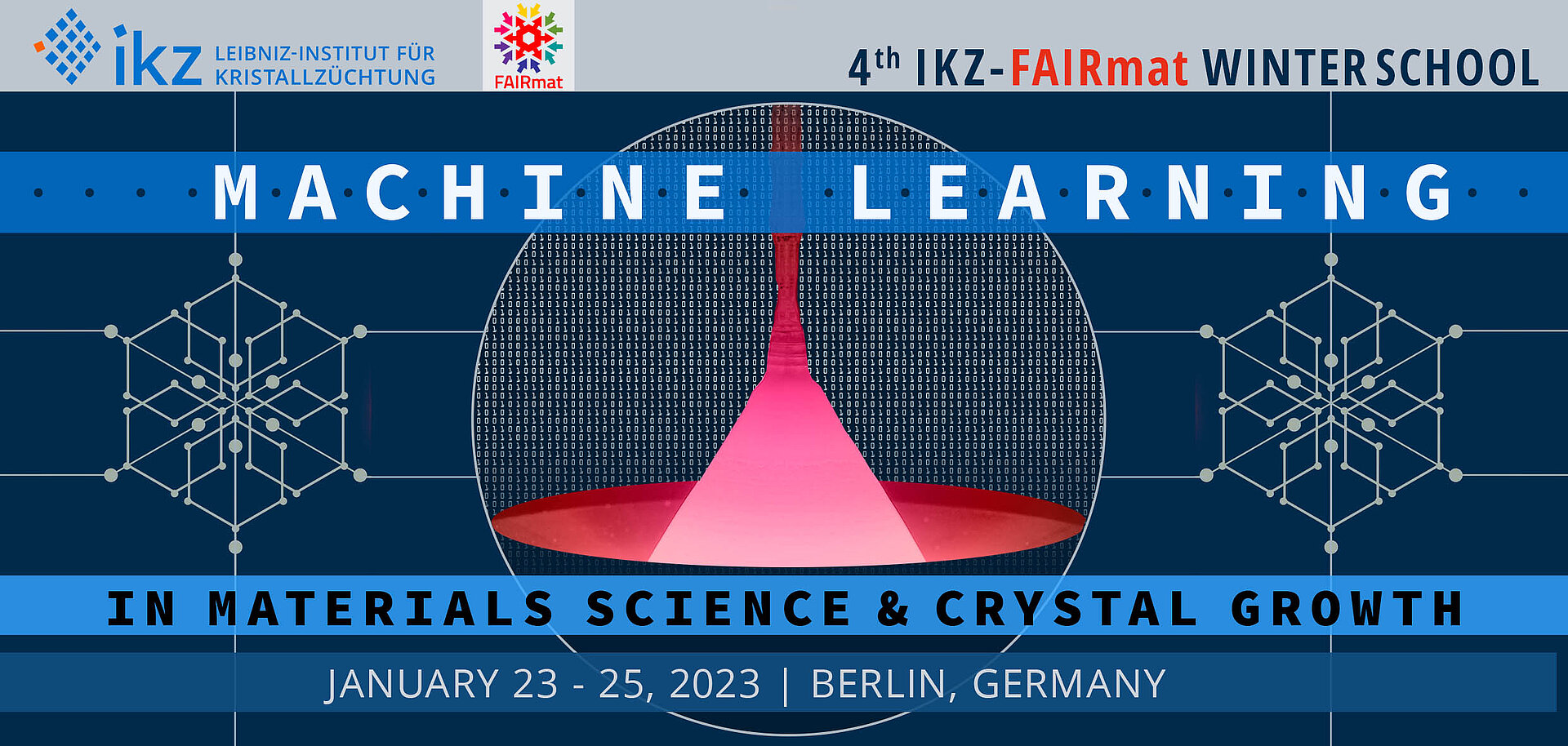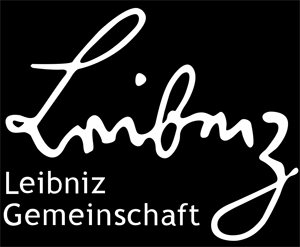4. IKZ Winterschool

The winter school will be held in English as a hybrid event.
The winter school is a cooperation between the Leibniz-Institut für Kristallzüchtung (IKZ) and the FAIRmat consortium.
Download Flyer
Venue:
Erwin-Schrödinger-Zentrum - Humboldt-Universität zu Berlin
Rudower Chaussee 26, 12489 Berlin
Arrival by public transport:
Please note that it is mandatory to wear an FFP2 mask on public transport.
S-Bahn: S45, S46, S85, S9 to Adlershof station + 10 min walk
Tram: 27, 61, 63, 67 to Magnusstraße
Bus: 162, 163, 164 to Magnusstraße
Route planner and timetable information
https://www.bvg.de/en/connections/connection-search
BVG Fahrinfo-App: Apple App Store | Google Playstore
Machine Learning (ML) opened up completely new opportunities in Material Science. Together with advances in research data management and software tools ML got more and more accessible. The IKZ Berlin and FAIRmat joint Winterschool invited internationally renowned lecturers to address ML in Material Science and Crystal Growth for any scientist new to the field.
There will be four main sessions:
1. Introduction to ML/AI: basics and general concepts of ML, data management for ML
2. Data Mining & ML assisted experimenting: how to use ML to extract data automatically from experiments and help making decisions
3. ML with small data: difficulties of ML with small data sets and which solutions exist
4. New potentials enabled by ML: what can be simulated now with the help of ML which was not possible before.
The lectures are accompanied by a hands-on tutorial based on our NOMAD AI toolkit.
Scientific data are a significant raw material of the 21st century, but the current research publication system and data infrastructures are not set up to promote easy access to and use of these data. To really exploit their value, data must be Findable, Accessible, Interoperable and Re-purposable.
FAIRmat is making this happen for the field of condensed-matter physics and the chemical physics of solids. By integrating synthesis, experiment, theory, computations, and applications, we will substantially further the basic physical sciences, reaching out to chemistry, engineering, industry, and society. FAIRmat operates and is building on the
NOMAD Laboratory, which offers cutting-edge tools for collecting, storing, presenting, and analyzing materials-science data to the international community.
Our approach is centered around our users, and we reach out to the scientific community at all stages of development, to ensure that our infrastructure meets their needs. We also offer a variety of workshops, tutorials and training materials aimed at researchers in all stages of their careers.
FAIRmat is funded as a consortium of the German Research-Data Infrastructure NFDI and represents a broad community of researchers from universities and other leading institutions in Germany.
- Lecture recordings on YouTube
- Please find here the tutorial notebooks of the winter school hosted on our NOMAD server
- individual notebooks via google colab:
- Dr. Daniel Schwalbe Koda: https://bit.ly/DSK-NNIPs-Tutorial
- Prof. Sergei Kalinin
Simple GP: https://colab.research.google.com/drive/1GHTlBpEeDDonOzK-YvYNZoSr-dBOXGw4?usp=sharing
Structured GP: https://colab.research.google.com/drive/1Cr-AHjZtGWiH4gOlRJnL0yiQjS_GKSNt?usp=sharing
Hypothesis GP: https://colab.research.google.com/drive/1AcPTYOAihVSjogMAXCkFiYStl8oSUUk2?usp=sharing
DKL: https://colab.research.google.com/drive/1XyBxJJfjE09e4_fI2FLKsZWMmYulSkdC?usp=sharing
Dr. Luca Ghiringhelli | The NOMAD Laboratory at Humboldt-Universität zu Berlin
"Introduction to artificial intelligence and its application to materials science"
Artificial Intelligence (AI) is a broad field developed by many researchers, across decades. The general goal is the development of algorithms that autonomously mimic human behavior, when interacting with data. However, the terminology is often contradictory among developers and practitioners. In this lecture, a systematic overview of the field of AI is presented, with a focus on proposing a coherent terminology, aimed at clarifying the main concepts and challenges. Main current and near-future applications of AI to materials science, as well as the concept of FAIR data-centric (materials) science, are also discussed.
The tutorial session will focus on exploring the NOMAD AI Toolkit, the web-based platform for performing AI analysis on the FAIR data stored in the NOMAD Repository and Archive.
Download Lecture notes
Lecture recording on YouTube
Dr. Markus Scheidgen | The NOMAD Laboratory at Humboldt-Universität zu Berlin
"NOMAD – managing and accessing FAIR research data"
In this lecture, we will lean how research data can be managed and accessed using NOMAD. We look into data and metadata, describe data with schemas, learn how to customise existing schemas and finally upload, manage, publish data on the NOMAD platform. We will also look into exploring and access NOMAD’s data for analysis. We learn about restful APIs and how to use the NOMAD API in particular.
Download Lecture notes
Lecture recording on YouTube
Prof. Bjork Hammer | Center for Interstellar Catalysis, Department of Physics and Astronomy, Aarhus University, Denmark
"Machine learning acceleration of global optimization"
Optimizing atomistic structure in a density functional theory (DFT) framework can be accelerated by on-the-fly construction of a machine learning potential. The ML-potential relies initially on very few data, but eventually attains a quality comparable to the full DFT calculations. The uncertainty of the ML-potential may further be used to steer the search into unknown territory, thereby constituting an active learning setting. In the presentation and tutorial, elements of an automated structural search method [AGOX] relying on a local descriptor energy expression [local-GPR] will be covered. Also, an algorithm [ASLA] that uses image recognition and reinforcement learning will be described.
Atomistic global optimization X: A Python package for optimization of atomistic structures
Atomistic structure search using local surrogate model
Atomistic structure learning
Download Lecture notes
Lecture recording on YouTube
Prof. Sergei Kalinin | Department of Materials Science and Engineering, The University of Tennessee, Knoxville
"Automated experiments - Workflow design"
automated experiment (and now more generally workflow design matching different experimental modalities and theory): why we need workflows, what type of elementary workflows can be designed based on short experimental sequences, and enabling ML methods including DCNNS, GP, sGP, and DKL.
Download Lecture notes
Lecture recording on YouTube
Dr. Daniel Schwalbe Koda | Lawrence Livermore National Laboratory
"Machine learning for interatomic potentials"
In this lecture, students will be introduced to several techniques in machine learning (ML) for interatomic potentials (IPs). Starting from the definition of classical potentials, historical approaches to MLIPs will be reviewed, along with their representations and models. Then, a particular focus will be given to deep learning approaches for IPs, from Behler-Parrinello to message passing neural networks to cutting-edge models in MLIPs. A few trade-offs on NNIPs will be highlighted, such as accuracy, speed, and generalizability, along with the challenges of dataset construction and uncertainty quantification. Examples and tutorials of NNIPs applied to materials and molecular systems will be provided throughout the lecture.
Program:
1. quick introduction to ML interatomic potentials (IPs);
2. overview of atomistic representations and models for MLIPs;
3. neural network (NN)-based IPs;
4. graph neural networks/MPNNs;
5. trade-offs in NNIPs: accuracy, speed, and generalizability;
Download Lecture notes
Dr. Kentaro Kutsukake | Center for Advanced Intelligence Project, RIKEN, Ujihara Laboratory, Nagoya University / Japan Center for Advanced Intelligence Project, Tokyo
"Bayesian optimization for material processes"
Bayesian optimization, a machine learning method for sequential optimization, is widely applied as an optimization method that balances exploration and exploitation. In the lecture talk, applications of Bayesian optimization to the actual material processes such as epitaxial growth of silicon films [1], hydrogen plasma treatment [2], and grinding of SiC wafers will be presented as well as the introduction of Bayesian optimization. In the tutorial, students will deepen their understanding of Bayesian optimization through hands-on practice using simple python code using sklearn library.
Download Lecture notes
Lecture recording on YouTube
[1] https://doi.org/10.1016/j.mtcomm.2020.101538
[2] https://doi.org/10.35848/1882-0786/abd869
Prof. Gian-Marco Ringanese | MODL, Chemin des Étoiles, Louvain-la-Neuve, Belgium
"Materials property prediction from limited and multi-fidelity datasets"
The available materials property data are often rather limited. Unfortunately, typical machine-learning approaches generally require large amounts of data to make accurate predictions. To tackle this limitation, I will introduce MODNet, an all-round framework which relies on a feedforward neural network, the selection of physically meaningful features, and when applicable, joint-learning. Next to being faster in terms of training time, this approach is shown to outperform current graph-network models on small datasets.
Furthermore, materials property data often present various levels of accuracy, with typically much less high- than low-fidelity data. I will present an approach to extract as much information as possible from all available data by improving the quality of the data through denoising.
Materials property prediction for limited datasets enabled by feature selection and joint learning with MODNet
A simple denoising approach to exploit multi-fidelity data for machine learning materials properties
Download Lecture notes
Lecture recording on YouTube
Prof. Volker Deringer | Department of Chemistry, Inorganic Chemistry Laboratory, University of Oxford, UK
"Gaussian process regression for atomistic materials modelling"
This lecture and tutorial will introduce atomistic machine-learning methods based on kernel (similarity) metrics, specifically the Gaussian Approximation Potential (GAP) framework for fitting interatomic potentials. The aim for this afternoon is twofold. First, we will provide a general overview, discussing how GPR-based methods are similar and different to other (e.g., neural-network) approaches commonly used in atomistic machine learning. Second, we will walk through a "hands-on" example of atomistic simulations enabled by GAP: we will show how these simulations are now routinely possible, how kernel methods can help to analyse a complex simulation trajectory, and how to validate the output. The afternoon will close with an outlook on the role of atomistic ML methods for next-generation materials modelling.
Download Lecture notes
| Monday, January 23 | |||
| 11:45am – 12:30pm | Registration / Welcome | ||
| 12:30pm – 2:00pm | Live talk | "Introduction to artificial intelligence and its application to materials science" | Luca Ghiringhelli |
| 2:00pm – 3:45pm | Live talk | "NOMAD – managing and accessing FAIR research data" | Markus Scheidgen |
| 3:45pm – 4:15pm | Coffee break | GERDAN's CAFE | Newtonstraße 16 | 12489 Berlin | Humboldt University of Berlin | |
| 4:15pm – 6:00pm | Live tutorial | "Introduction to ML and FAIR research data management" | Ghiringhelli / Scheidgen |
| Tuesday, January 24 | |||
| 9:00am – 10:30pm | Live talk | "Machine learning - Acceleration of global optimization" | Bjork Hammer |
| 10:30am – 11:00am | Coffee break | GERDAN's CAFE | |
| 11:00am – 12:00pm | Live tutorial | "Acceleration of global optimization" | Bjork Hammer |
| 12:00pm – 1:00pm | Lunch break | ||
| 1:00pm – 4:00pm | Remote talk + tutorial | "Automated experiments - Workflow design" | Sergei Kalinin |
| 4:00pm – 4:30pm | Coffee break | GERDAN's CAFE | |
| 4:30pm – 6:00pm | Remote talk + tutorial | "Machine learning for interatomic potentials" | Daniel Schwalbe Koda |
| Wednesday, January 25 | |||
| 9:00am – 10:30am | Live talk + tutorial | "Materials property prediction from limited and multi-fidelity datasets" | Gian-Marco Rignanese |
| 10:30am – 11:00am | Coffee break | GERDAN's CAFE | |
| 11:00am – 12:00pm | Live talk | "Bayesian optimization" | Kentaro Kutsukake |
| 12:00pm – 12:30pm | Lunch break | ||
| 12:30pm – 2:00pm | Live tutorial | "Bayesian optimization" | Kentaro Kutsukake |
| 2:00pm – 2:30pm | Coffee break | GERDAN's CAFE | |
| 2:30pm – 5:30pm | Remote talk + live tutorial | "Gaussian process regression for atomistic materials modelling" | Volker Deringer |
All times shown are CET (central european time) |
To register please send email with
- Details of your institution and position
- Whether you will attend in-person or online
to winter.school(at)ikz-berlin.de
After registration you should receive a confirmation email within 1 working day.
Please remember to check your spam folder.
Winter School participation is free of charge.
Participants are asked to organize their accommodation by themselves.
As the number of participants is limited early registration is recommended.
Registration deadline: 15-01-23
Organization:
Lucia Alessandra Rotheray
Ph: +49 30 2093 82582
winter.school(at)ikz-berlin.de
Scientific questions:
Dr. Sebastian Brückner | Data Science, IKZ
Ph: +49 30 6392 3107
E-Mail

